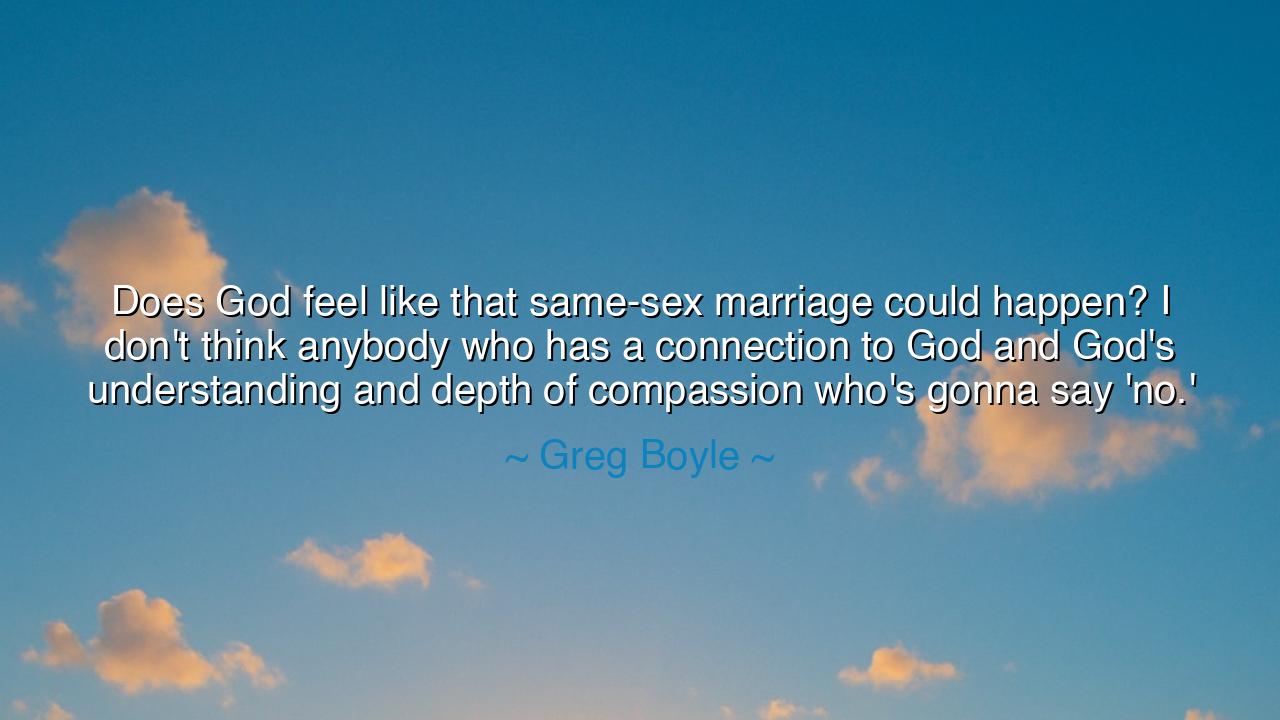
Does God feel like that same-sex marriage could happen? I don't
Does God feel like that same-sex marriage could happen? I don't think anybody who has a connection to God and God's understanding and depth of compassion who's gonna say 'no.'






Hear, O children of tomorrow, the tender and daring words of Greg Boyle, priest and servant of the poor, who said: “Does God feel like that same-sex marriage could happen? I don’t think anybody who has a connection to God and God’s understanding and depth of compassion who’s gonna say ‘no.’” In this utterance is the blending of ancient faith with modern yearning, the voice of one who sees divinity not as a judge bound by law alone, but as a parent whose heart overflows with mercy. His words invite us to ponder what it means to know God—not merely through doctrine, but through compassion, through love, through an intimacy that transforms the heart.
Boyle begins by asking not what men decree, nor what laws declare, but what God feels. This is no small thing. For generations, the question of marriage—especially same-sex marriage—has been debated in the courts of nations and the pulpits of churches. Some argue from scripture, others from tradition, still others from reason. But Boyle pierces deeper, asking: what does the God of compassion, the God of love, say? And his answer is simple: that no one truly united to the divine heart could deny the dignity of love, even between those of the same sex.
The origin of such compassion is found in the very life of the Christ whom Boyle serves. The Gospels show a man who dined with outcasts, touched the untouchable, and spoke words of dignity to those scorned by the righteous. When the Pharisees asked for rigid adherence to law, Jesus replied with mercy, saying, “The Sabbath was made for man, not man for the Sabbath.” In this same spirit, Boyle suggests that marriage too, when rooted in love and fidelity, cannot be denied simply because tradition hesitates. For the law is meant to serve compassion, not to strangle it.
History offers us many examples of tradition being overturned in the name of love. Recall William Wilberforce, who labored to end the slave trade in Britain. Many at the time argued that slavery was sanctioned by scripture and custom, yet Wilberforce appealed to the deeper law of God’s compassion, declaring slavery a moral evil. Over time, love prevailed against entrenched tradition. So too, Boyle’s words suggest that when confronted with the question of same-sex unions, the compassionate heart of God cannot be imagined as saying “no.”
But his words are not only about marriage. They are about the very nature of God. Boyle describes God as a being of “understanding and depth of compassion.” This challenges images of the divine as cold judge or distant ruler. Instead, he portrays God as one who draws near to human weakness, who embraces diversity, who celebrates love in all its forms. To know God, then, is to enter into that compassion, and once inside, how could one deny love to another?
O beloved, hear the lesson: do not be quick to bind God’s name to exclusion. For if your faith leads you to cast out, to wound, or to deny dignity, perhaps it is not God’s heart you have touched, but your own fear. The measure of true connection with the divine is not zeal for rules, but depth of compassion. Where love flourishes, there God dwells, regardless of how unexpected its form may be.
What then must you do? Seek to deepen your own connection with God not by clinging to law alone, but by enlarging your heart. When confronted with difference, ask not first, “What is permitted?” but rather, “What is compassionate?” If you are called to faith, let your faith expand, not constrict; if you are called to justice, let it be softened by mercy. Above all, defend the right of others to love, for in doing so, you mirror the love of God that defends you.
Thus, Greg Boyle’s words ring as both challenge and comfort. He declares that a God of compassion cannot deny love, and that those who truly know the divine will not either. Let this be the torch you carry: that the essence of God is not prohibition, but mercy; not rejection, but embrace. And in this light, love—whether between man and woman, or woman and woman, or man and man—becomes not an offense to heaven, but a reflection of its deepest truth. For God is love, and wherever love abides, God says “yes.”






AAdministratorAdministrator
Welcome, honored guests. Please leave a comment, we will respond soon